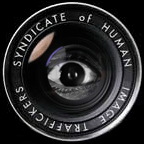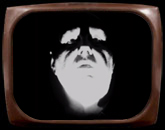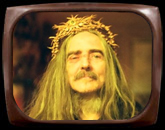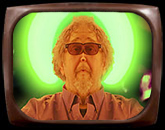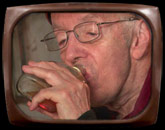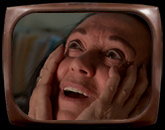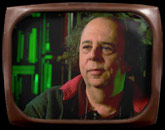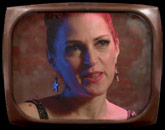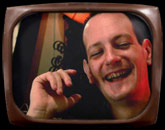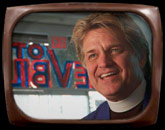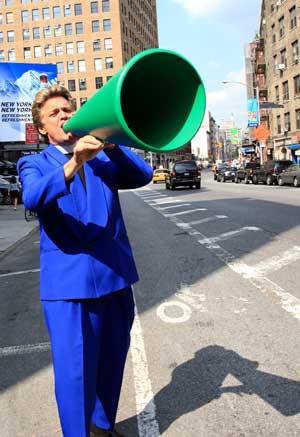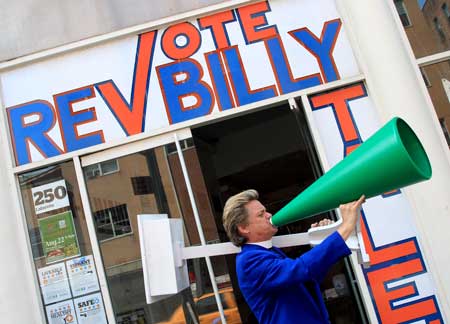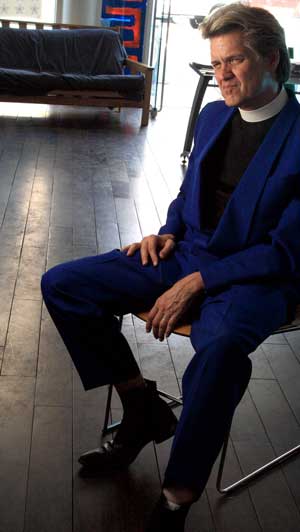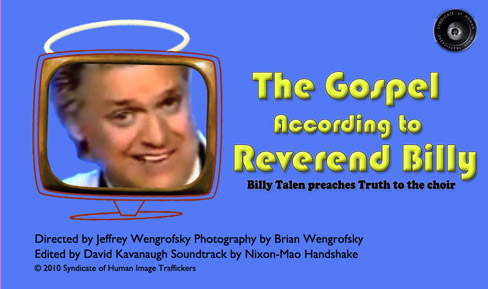

The Gospel According to Reverend Billy
“Man is born free, but he is everywhere in chains.” – Rousseau
The prime, often countervailing, logics of 21st Century America – capitalism and democracy – seem dangerously out of balance today. Meanwhile, vestigial factors, like Puritanism, sometimes affect public life in surprising ways. Since the Giuliani years, America’s largest city – New York – has seen lower crime, infrastructural investments, an infusion of capital, a proliferation of chain stores, a vast profusion of surveillance devices and, perhaps, the general evisceration of democracy. Just recently, Mayor Michael Bloomberg ignored widespread opposition to the construction of two billion dollar stadiums and the much-maligned Atlantic Yards construction project. More egregiously, he bullied our City Council into overturning a term limits law that had been passed fifteen years earlier by public referendum. Now running for his third term, Bloomberg’s campaign war chest has intimidated all prominent Democratic challengers.
As politics appears as (yet another) massively-financed spectacle of buzzwords, scandals, outsized personas and deep psychology, is it possible to enter the political fray without selling your soul?
Can we get the attention of the public eye by taking on an identity at once striking and also familiar to our public culture? Fifteen years ago, William Talen began the process of becoming a New Yorker and re-inventing himself as “Reverend Billy.” Today, armed with this identity, he enters churches of consumption – like the Disney store in Times SquareÊ- to project a powerful message opposing corporate retail, a culture of consumerism, and the encroachment of our public spaces.
Reverend Billy’s charisma, energy, and smarts have gathered him a gospel choir, the attention of CNN, a documentary film by Morgan Spurlock “What Would Jesus Buy”, and now the nomination of New York’s Green Party for the 2009 mayoral race. Reverend Billy combines a Nixonian charm, the overly stylized tropes of a preacher, and, perhaps as prime mover, a rich Calvinist heritage. America has a long history of Calvinist preachers – you may know them as “Puritans” – who rail against impure desires, the “moneychangers,” and fret mightily for the souls of their congregants.
Having written an article decrying the evils of shopping malls twenty years ago, I wonder if Reverend Billy’s message is especially timely in an age of ever-bigger, ever-greedier capital. Does working for a big corporation make you an entrepreneur or a bureaucrat? When chain stores achieve virtual monopolies over advertizing media, joint ventures with government, and prime locations, do we shop in them under our own volition?
On the other hand, do Reverend Billy’s antics disrespect your choice to bring your kid to a Disney store without some loudmouth with a megaphone and a choir hectoring you? Is this a case of personal decisions having a truly political nature or is righteousness slipping into self-righteousness? If Billy’s anti-consumerist crusade is, as he says, psychologically rooted in his Calvinist heritage, what can we learn from the history of “Puritanical” movements? How do Calvinists regard freedom of choice? Should his candidacy trouble those fearful of religion (mysticism, spirituality) in politics or is this a lampoon that suggests the opposite?
Just how dire is our condition? Does the repeal of mayoral term limits suggest the eclipse of democracy or are term limits an affront to the free choice of citizens to vote for whomever they choose? Do the excesses of the Bloomberg years require a reformist leader from outside the two-party axis? Are Billy’s moxie and inventiveness necessary for a leader facing dangers created by business as usual? Is the story of his campaign that New York City politics is a plutocracy, a vital democracy open to all voices, or a joke worthy of performance art? Has Reverend BillyÔs experience as a performance artist and political activist provided him with a sense of the City unknown to party machines? Even if he doesn’t win, is his candidacy a success for having introduced a unique and important set of issues? Supposing again that he doesn’t win in his bid for mayor, would a candidate who is solely dedicated to the issues run for a lower elected office or return to protest in civil society?
In practical terms, what would happen to New York City if Reverend Billy was elected? Would we have a greener, more egalitarian, pluralistic city, one more open to entrepreneurship? Or would the wealthy and their enterprises – like the Stock Exchange – merely move out of state? Since the stock market accounts for nearly ten percent of the City’s budget and one percent of tax filers provide nearly HALF of revenue, would New York City return to how it was in the 1970s, when it went bankrupt and lost a million inhabitants (despite immigration)? Does the addition of one million residents since 1990, at a time when Philadelphia, Detroit, Milwaukee and other cities shrank, suggest the City has been better run by Republicans? Is New York City a hostage to capital? Do bankers make good neighbors? Is it possible or advisable to be principled under these circumstances? If not now, when?
As being and seeming are smudged in postmodern performativity, a question emerges: Is Reverend Billy a reverend-turned-activist-turned-actor-turned-reverend-turned-politician or an activist-turned-actor-turned-reverend-turned-politician or an actor-turned-reverend-turned-politician or a politician-turned-actor-turned-reverend-turned-politician? You decide – especially those of you who can vote on November 3rd in New York City.
S.H.I.T.
Words like “community” and “neighborhood” have a special resonance for your choir. Are you a New Yorker?
Reverend Billy
I grew up in Watertown, South Dakota and Rochester, Minnesota, and I always dreamed of being a New Yorker, the way you can dream of New York on the prairie. When the satellites would go up across the night sky, I used to think they were New York City flying through space. I first moved here in 1974, stayed a couple of years. Moved back again in the early 80s and, for a longer period of time, in the late 80s. I was like a hitchhiker, I would come and crash in the Lower East Side. In March of 1994, I don’t know why exactly, my commitment became permanent.
S.H.I.T.
Do you feel like a New Yorker?
Reverend Billy
I do now because I perform in so many neighborhoods. I marry, baptize and bury New Yorkers in so many different boroughs. We – me and Savitri and the choir – some of us were born here and many of us are immigrants, we like the idea of a homemade spirituality that does not necessarily come from an organized religion. That idea became a New York idea after 9-11. Many of us gathered in rooms. The Reverend Billy idea of a different God or Goddess every day with another name, staying out of trouble with deities that cause us to kill each other, that kind of fellowship, I needed it, too.
S.H.I.T.
Is there a distinctive meaning to being a New Yorker, as opposed to other large cities, like Cleveland (with all due respect to the citizens of Cleveland)?
Reverend Billy
There’s a kind of harsh dance in New York. I’m a refugee from the theater world. When we aim for that proscenium arch that is the space between two buildings and there are too many of us, we just hit each other. We laugh and seduce and swear and culture happens. That’s New York. I’ve been in love with that for a long time. New York has its own eccentric, yet universal feeling.
S.H.I.T.
Where, when and why did you first become politically active?
Reverend Billy
We were always political, the Church of Stop Shopping, which became the Church of Life After Shopping during the recession. I was complaining to the choir that I was screaming “Stop shopping!” to people who were broke. That might have been a prophesy last year, but now we have to think about how to live after the consuming culture, with all its pain and glory, has crashed. It was always political. In the late 90s, when I was preaching in the doorway of the Disney Company: “Mickey Mouse is the Antichrist, my child. Don’t bring your little tourist family into this den of iniquity. They’re sweatshop products, every one of them. You don’t want to buy those Pocahontas pajamas!”
S.H.I.T.
What was it that drew you into politics and when? Was there a moment, when talking to a teacher or parent or friend, when you thought that the world isn’t as it could be?
Reverend Billy
As far as the psychological damage in me that makes me want to help everybody, I don’t know. I’m a Dutch Calvinist from western Michigan and these are severe, right-wing, judgmental people who are terrified: hell is very close and heaven is not promised. John Brown, who started the Civil War with Harriet Beacher Stowe, the lady who wrote Uncle Tom’s Cabin. [Brown] was a Calvinist. Abraham Lincoln was a Calvinist. I think that Calvinism is not something that’s so directly a religious bequest as it’s a fascistic psychic presence, as it is for me. I was raised by them. I was supposed to be in the Dutch Reformed Church.
S.H.I.T.
As a parishioner or as a minister?
Reverend Billy
The difference is not that great. It’s a cult. It’s not quite the same thing as the upper crust Dutch of [Martin] Scorsese’s “Age of Innocence.” It’s more like the Afrikaners who invented Apartheid…
S.H.I.T.
…or the people Max Weber wrote about in The Protestant Ethic and the Spirit of Capitalism?
Reverend Billy
Exactly.
S.H.I.T.
At it’s base, in terms of Weber, Calvinism leads to a certain disquietude, a neurosis, because the Elected are few in number and we are so great in number can never know who is so destined since acts themselves cannot bring us to heaven.
Reverend Billy
God is the ultimate elect, though the high end of the Chamber of Commerce may to persuade you that they are, so you become culturally neurotic.
S.H.I.T.
Now, you, yourself are running for “election.” An interesting twist, isn’t it?
Reverend Billy
You gave me some goosebumps – you’re getting too close! Running against a God-like figure, with his Falcon-900 jets and his eleven million dollars a week that he makes, there is a certain psycho drama there. A shrink would have a field day with the whole thing.
S.H.I.T.
Bill Thompson got the endorsement of the Working Families Party. Why didn’t they give you the endorsement?
Reverend Billy
They didn’t even invite Reverend Billy to the debate. They got their signals crossed. Two different sides of the office were telling mutually-exclusive falsehoods. One part of the office was saying, “You didn’t respond to our request,” which was not true, and the other part said, “You’re a protest candidate, and we love that, but we’re interested in people who can win.” What we really need in New York right now [is] new voices, new imaginations, new ideas. We need to not default back to traditional solutions – they’re not working. It’s a mistake to exclude third party ideas. They need to come out into the air and we need to accept or reject or argue with or be changed by them.
S.H.I.T.
What more can be done to help prepare New York City, flat islands near sea level, from global warming?
Reverend Billy
Today we’re sending out press releases, pretending we’re the Intrepid Museum, accepting Bloomberg’s two Falcon-900 jets, saying that he’s so ashamed of his CO2 emissions that he’s donating them to the museum. We need a leader who says, “We’re addicted to the two stroke engine. We’re addicted to leaf blowers and generators in parks.” More than half of New Yorkers still believe that we should drive everyday. We still don’t have a leader who will go into people’s lives and say: “Recycling is not working right now. We sill have a nine mile long convoy of garbage trucks leaving the City every 24 hours – 12,000 tons – and we pay people to take our landfill. When we have a rain storm of a certain size, our sewers overflow into our water system, and we sometimes don’t have filters to keep the water clean enough fast enough.” We don’t have a leader. [Bloomberg] is not the guy who he says he is in his ads in his windbreaker at the corner deli talking to people. That’s a video game. He isn’t that guy. We need someone who is comfortable going into the neighborhoods and saying, “We all have to change now and the rich can’t buy their way out of it. We all have to change together or these streets are going to be under water.”
Clive Thompson, “Why the Next Civil Rights Battle Will Be Over the Mind,” Wired, March, 24, 2008.
Thomas P. DiNapoli, New York State Comptroller, Press Release, October 30, 2007

